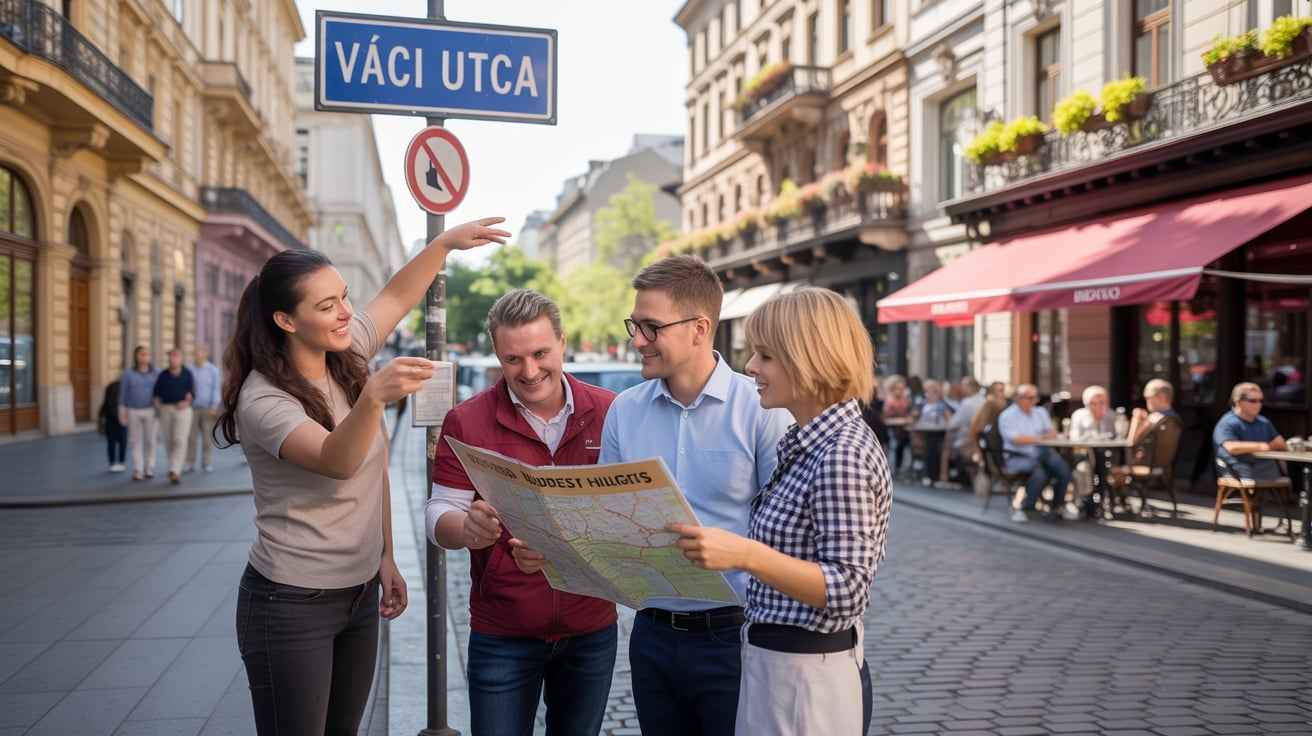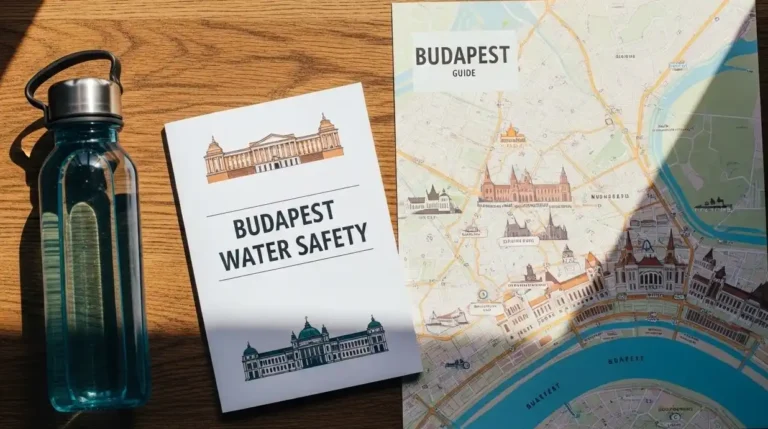Do People Speak English in Hungary? A Friendly Guide for Travelers
Yes, many people in Hungary, especially in cities like Budapest and tourist areas, speak English well—particularly the younger generation and those working in hospitality and services.
They do—especially in major cities like Budapest, where English is widely spoken in restaurants, hotels, bars, and tourist spots.

- English in cities: Widely spoken in Budapest and major urban areas.
- Young speakers: Youth and professionals speak fluent English.
- Tourist zones: Hotels, restaurants, and signs use English.
- University towns: Cities like Szeged, Pécs, Debrecen have many English speakers.
- Countryside: Limited English, but locals are friendly and helpful.
- Official language: Hungarian is the main language; English is the top foreign language.
- Daily life: You don’t need Hungarian to visit or live in Hungary.
- Cultural respect: Learning a few Hungarian words is nice but optional.
- Trend: English usage is increasing across Hungary.
Many locals working in tourism and customer service are comfortable speaking English and are used to helping international visitors.
English is a popular second language in Hungary.
Most young people study it in school, and about 97% of European schoolchildren learn English.
As a result, the younger generation in Hungary often speaks it well, making communication easier for travelers.
Even if you don’t speak Hungarian, you can usually get by in the city and tourist areas without problems.
Public places, signs, and menus often have English translations, and locals are generally friendly and helpful.
Hungary is becoming more English-friendly over time, especially in urban areas.
So whether you’re visiting for business or vacation, you’ll find that speaking English is enough to enjoy your stay.
Where Is English Spoken in Hungary?
Do They Speak English in Budapest?
Yes, English is widely spoken in Budapest, especially in tourist areas like hotels, restaurants, bars, and popular attractions.
Most locals, particularly the younger generation and professionals, can communicate in English easily.
English is widely spoken in Budapest, making it easy for tourists and foreigners to explore the city.
Many locals, especially the younger generation and professionals, have a good knowledge of English.
You can communicate easily in places like hotels, restaurants, bars, and tourist attractions.
In touristy areas, you’ll find English signs, helpful staff, and friendly people ready to offer guidance.
Even in some outer zones, basic English is commonly understood.
Using a few Hungarian phrases shows respect and is always appreciated, but it’s not required to get around.
Traveling in Budapest is smooth, and locals are known for their friendly approach and understanding.
Whether you’re asking for information or directions on the street, you’ll likely find someone who speaks English well.
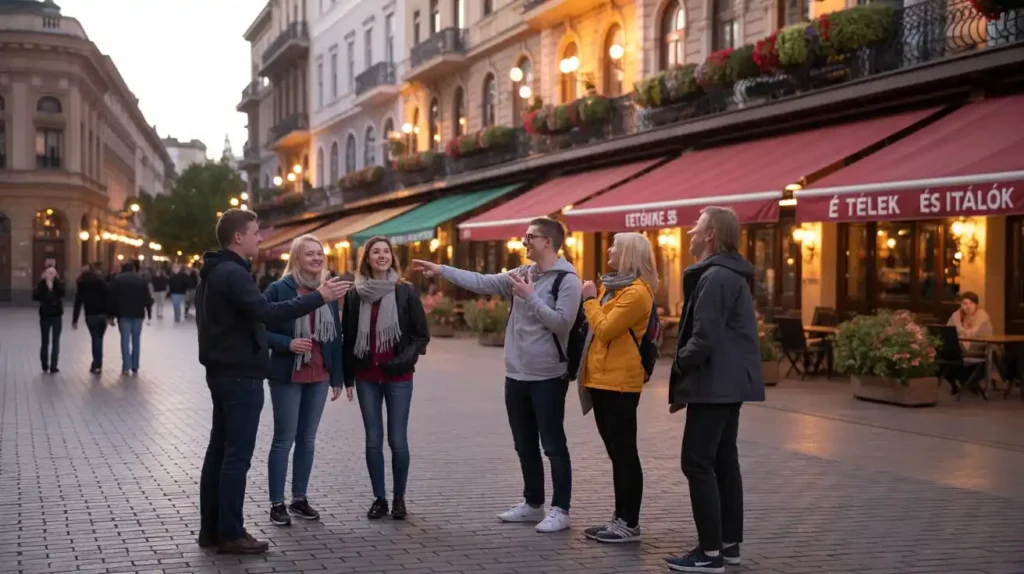
English in Other Cities (Debrecen, Pécs, Szeged, etc.)
English in Other Cities (Debrecen, Pécs, Szeged, etc.) is commonly understood and spoken, especially in areas with universities and young populations.
Cities like Szeged, Pécs, Debrecen, and Eger are known for their large student communities, which creates a friendly environment for English-speaking visitors.
You’ll find that many young people, particularly students, can speak English and are open to helping tourists.
Even if someone knows just a few words, they often try their best to communicate.
This makes travel smooth and enjoyable for English speakers.
Whether you’re asking for directions, ordering food, or having a casual chat, chances are you’ll find someone who understands you.
These cities offer a welcoming and comfortable experience for travelers who speak English.
Do They Speak English in the Hungarian Countryside?
Yes, in some parts of the Hungarian countryside, especially in areas with younger people or where tourism is growing, you may find locals who speak basic English.
While fluency isn’t widespread, many people are kind and willing to help using simple words, gestures, or body language.
English is not commonly spoken everywhere in the Hungarian countryside, but that doesn’t mean communication is impossible.
In many smaller villages, especially those less visited by tourists, English may be limited.
However, younger residents or those connected to tourism may know some basic English phrases.
What stands out most is the warm and helpful nature of the local people.
Even without fluent English, many Hungarians use gestures, smiles, and simple words to help visitors.
With a little patience and friendliness, it’s often easy to get the message across.
Tourism is gradually increasing in rural Hungary, so English is becoming more common over time.
Visitors can feel confident and welcomed, even in quieter regions.
Who Speaks English in Hungary?
English is commonly spoken in Hungary, particularly in urban centers like Budapest and popular tourist destinations.
The younger generation, especially students and professionals, tends to speak English very well due to education and global media exposure.
In cities and places that attract international visitors, you’ll easily find locals who can assist you in English.
From restaurants and hotels to museums and shops, many staff members are comfortable communicating in English.
While rural areas may have fewer English speakers, the warm and helpful nature of Hungarians ensures visitors can still navigate and enjoy their stay.
Younger people are your best option for clear communication in English across the country.
Do You Need to Speak Hungarian to Visit or Live in Hungary?
No, you don’t need to speak Hungarian to visit or live in Hungary.
Many people get by with English or German, especially in cities, though learning a few Hungarian words can improve your experience and connection with locals.
Hungary welcomes many visitors and new residents who do not speak Hungarian.
In major cities like Budapest, English is commonly spoken, especially among younger people and in service areas.
German is also widely understood due to strong business ties with Germany.
While it’s not necessary to be fluent, learning a few basic Hungarian phrases can be very helpful.
It shows respect for the local culture and often leads to friendlier interactions with locals.
Many foreigners live, study, or work in Hungary successfully without mastering the language, often using tools like Google Translate when needed.
If you’re planning to live in Hungary long-term, picking up the language gradually can enhance your daily life, but it’s absolutely possible to start your journey without fluency.
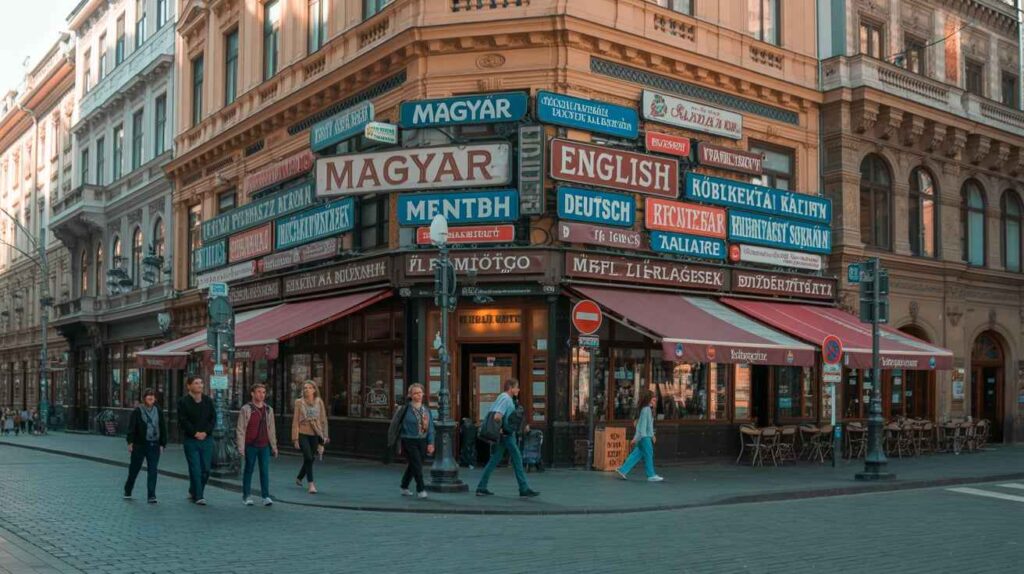
What Language Do They Speak in Hungary?
Hungarian is the official and most widely spoken language in Hungary.
It is used by about 98–99% of the population as their first language.
Known for its unique linguistic roots, Hungarian belongs to the Uralic language family and is not closely related to the languages of neighboring countries.
Minority and Regional Languages
In addition to Hungarian, several recognized minority communities speak their native languages. These include:
- German, spoken by ethnic Germans especially around the Mecsek Mountains
- Slovak, used by communities in northern Hungary near Békéscsaba
- Romanian, common in and around the Gyula region
- Croatian, Serbian, and Slovene, spoken in southern border areas
- Romani, spoken by the Romani community across various regions
These languages are part of Hungary’s cultural diversity and are supported and preserved through local education and community efforts.
Foreign Languages in Hungary
English and German are the most commonly spoken foreign languages in Hungary.
As of the last census, over 16% of the population speaks English, and more than 11% speak German.
These languages are widely taught in schools and are increasingly used in business, tourism, and higher education.
Hungary’s linguistic landscape reflects a strong national identity through Hungarian, while also embracing multiculturalism and growing interest in global languages.
Do I Need to Be Able to Speak Hungarian to Travel in Hungary?
No, you don’t need to speak Hungarian to travel in Hungary.
English is widely spoken in cities, tourist areas, and by the younger generation, making it easy for travelers to communicate and get help.
Most people in Hungary’s main cities and popular tourist spots can communicate in English.
This includes hotel staff, restaurant servers, and employees at tourist attractions who are used to assisting international visitors.
In Budapest, the capital and most visited city, English is especially common, particularly among the younger generation.
Even when you need directions or help, younger locals are usually very helpful and comfortable speaking English.
If you’re traveling to other cities like Szeged, Pécs, Debrecen, or Eger, you’ll still find it easy to get by.
These are major student cities with many university students who are fluent in English.
Overall, whether you’re exploring big cities or university towns, speaking Hungarian isn’t required to enjoy your trip across Hungary.
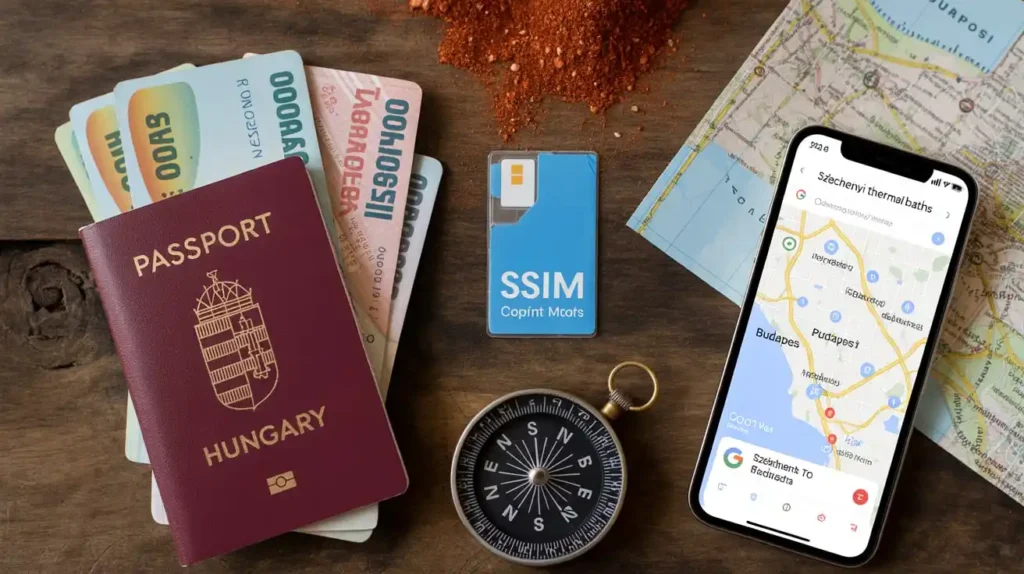
Bonus: Hungary Travel Essentials (2025 Guide)
How to Get from Budapest Airport to the City Center?
Getting from Budapest Airport to the city center is simple, convenient, and offers multiple options to suit your budget and travel style.
The most popular and hassle-free option is taking a taxi or booking a private airport transfer, which takes you directly to your accommodation in the city center with comfort and ease.
For a more affordable yet efficient option, the 100E Airport Express Bus provides a direct route from Terminal 2 to Deák Ferenc tér, right in the heart of Budapest.
This bus is ideal for tourists heading straight downtown and operates on a reliable schedule.
Alternatively, the 200E bus runs 24/7 and connects the airport to Kőbánya-Kispest Station, where you can easily transfer to Metro Line 3 and continue your journey to the city center.
All these options are traveler-friendly, reliable, and make your arrival in Budapest smooth and stress-free.
Should I Get a Hungarian SIM Card?
Yes, getting a Hungarian SIM card while visiting Hungary is highly recommended.
It gives you access to local rates for calls and mobile data, helping you stay connected without overpaying on roaming charges.
You’ll enjoy fast internet, reliable service, and the ability to use apps like maps, rideshare, and translation tools with ease.
Buying the SIM card directly in Hungary is simple and offers immediate activation.
Another great benefit is having access to local customer support in case you face any issues.
Shops and kiosks at airports, malls, and convenience stores make the process hassle-free, with friendly assistance available.
Choosing a Hungarian SIM card ensures smooth communication, better travel convenience, and peace of mind throughout your stay.
Currency Tips: HUF, Cards, and ATMs
Using your debit card or withdrawing cash from ATMs in Hungary is easy and convenient.
To get the most favorable rates, always select to be charged in Hungarian Forints (HUF) instead of your home currency.
This simple step helps you avoid unnecessary exchange fees.
Your own bank typically offers a more competitive exchange rate than what local ATMs or card terminals provide.
Paying in local currency not only saves money but also ensures transparent and fair transactions.
Whether you’re dining out, shopping, or booking transport, choosing to pay in HUF gives you better value and a smoother financial experience in Hungary.
Is Public Transport in Budapest Good?
Public transport in Budapest is excellent and widely praised by both locals and tourists.
The system includes buses, trolleybuses, trams, and four metro lines that operate frequently and punctually, ensuring smooth connections throughout the city.
Whether you’re commuting to major attractions or exploring different districts, public transport makes moving around easy and stress-free.
Tram line 2 is especially popular for its scenic route along the Danube River, offering views of iconic landmarks.
You can access nearly every corner of Budapest using public transport, and many stations are centrally located near tourist spots, shopping areas, and historical sites.
Tickets are affordable, and there are convenient options for daily, weekly, or monthly passes.
Budapest’s well-maintained and efficient network ensures a pleasant travel experience, making it one of the best ways to explore the city comfortably.
Can I Drink Tap Water in Hungary?
Tap water in Hungary is safe to drink, whether you’re in the capital city of Budapest or traveling through the countryside.
Hungary follows strict water quality standards, and all public tap water goes through thorough purification and treatment processes before reaching households and public taps.
Both locals and tourists regularly drink tap water without any issues.
The water is not only safe but often of high quality, making it a convenient and cost-effective option during your stay.
If you’re traveling with a refillable bottle, you’ll find plenty of places in Hungary where you can easily fill up with fresh tap water.
It’s an eco-friendly and practical choice for staying hydrated.
Safety Tips for English Speakers
Safety tips focus on helping you enjoy your trip with ease and confidence.
Start by asking for the menu and price list before you order at any restaurant.
This keeps things transparent and helps avoid confusion.
Always double-check your bill before making payment to ensure everything is accurate.
Choose places that clearly display prices, and feel free to ask staff for clarification when needed.
When using taxis, prefer official services or ride-hailing apps for a hassle-free journey.
If you ever feel unsure about a situation, you can always reach out to local authorities.
Hungary is a welcoming and tourist-friendly country, and with a few simple precautions, your experience can be both safe and memorable.
Related Guides
Is It Safe to Travel to Hungary Now?
Yes, Hungary is one of the safest countries to visit in 2025, backed by global rankings and government safety measures that ensure a secure experience for tourists.
Hungary is recognized as one of the world’s safest travel destinations in 2025, making it an excellent choice for travelers.
According to a global ranking by HelloSafe, Hungary stands out for its high safety standards and low risks for tourists.
The Hungarian government actively prioritizes public safety and has put effective measures in place to protect both locals and international visitors.
Whether you’re exploring Budapest or venturing into the countryside, the environment is welcoming and secure.
Travelers can enjoy Hungary’s rich culture, historic sites, and natural beauty with confidence, knowing that safety is well-maintained across the country.
Cost of Living in Hungary (2025)
Cost of Living in Hungary in 2025 remains moderate, offering great value for both locals and international residents.
Prices vary slightly based on city and lifestyle, but overall, Hungary provides a balanced and budget-friendly living experience.
Dining out is accessible, with a meal at an inexpensive restaurant averaging around 4,000 Ft.
A three-course dinner for two at a mid-range restaurant typically costs between 12,000 Ft and 30,000 Ft.
Fast food options like a McMeal are also available for under 3,000 Ft.
Grocery shopping is economical. Items like milk, bread, rice, eggs, fresh fruits, vegetables, and meats are widely available and affordable.
For example, 1 lb of chicken fillets costs around 887 Ft, and apples or bananas are usually under 300 Ft per lb.
Local markets offer fresh produce at reasonable prices.
Transportation is convenient and budget-friendly.
A one-way ticket on local transport costs about 450 Ft, while a monthly pass ranges from 7,200 Ft to 9,990 Ft.
Taxis and gasoline are also priced competitively. Buying a new car like a Toyota Corolla or Volkswagen Golf is possible for around 10 million Ft.
Utility costs are manageable.
For an average 915 sq ft apartment, basic utilities such as electricity, heating, water, and waste services average around 53,455 Ft per month.
Internet with unlimited data and good speed (60 Mbps or more) typically costs about 6,250 Ft.
Leisure and fitness activities are accessible, with fitness club memberships ranging from 9,500 Ft to 23,000 Ft per month.
Entertainment like cinema tickets and tennis courts are affordably priced.
Childcare and education options vary. Private preschools and international schools are available, with fees that reflect the quality of service and facilities.
Shopping for clothing is easy, with options like Levis jeans, Nike shoes, and outfits from brands like Zara and H\&M at moderate prices.
Rental costs depend on location. A one-bedroom apartment in the city center rents for 120,000 Ft to 280,000 Ft, while outside the center ranges from 100,000 Ft to 200,000 Ft. A three-bedroom apartment ranges up to 500,000 Ft.
For those looking to invest, apartment purchase prices per square foot in the city center average around 102,854 Ft, while prices outside the center are slightly lower.
The average monthly net salary in Hungary is approximately 361,120 Ft. Mortgage interest rates for fixed 20-year terms range between 6.50% and 13.00%, making long-term financing predictable.
Hungary in 2025 offers a stable, enjoyable lifestyle with a good balance between quality and affordability.
How Hard Is Hungarian to Learn?
Hungarian is unique and rewarding to learn, with a logical structure and rich cultural background.
While different from English, consistent practice and the right resources make it an enjoyable and achievable language to master.
Hungarian is a fascinating language with its own system of logic and structure.
It may look different from English at first, but that difference is what makes it interesting and intellectually rewarding.
Hungarian uses agglutination, meaning that words are built by adding suffixes.
For example, a single word like barátnőmmel translates to “with my female friend.”
This system becomes easier with practice, especially once you get familiar with common patterns and word endings.
There are 18 case suffixes in Hungarian, which help express precise meanings without needing many extra words.
This makes the language both compact and expressive.
Many learners find that once they understand the structure, it becomes easier to pick up vocabulary and grammar.
With modern tools like language apps, Hungarian courses, native speaker content, and online communities, learning Hungarian is more accessible than ever.
The key is consistency, curiosity, and a love for discovering something new.
FAQs: English in Hungary (2025)
Can I survive in Budapest without Hungarian?
Yes, you can. Most people in Budapest speak English, especially in hotels, shops, and tourist places.
What about taxis, grocery stores, or pharmacies?
In big cities like Budapest, many taxi drivers and shop workers understand basic English and are happy to help.
Are menus in English?
Yes, many menus in restaurants and cafes have English translations, especially in tourist areas.
Can I get by with just Google Translate?
Yes, Google Translate works well for simple needs. Locals are friendly and often help if you get stuck.
Are Hungarians friendly to English speakers?
Yes, Hungarians are very kind and helpful to English speakers, especially in cities and tourist spots.
Do young people speak fluent English?
Yes, most young people learn English in school and speak it well. They are easy to talk to.
What is the best way to learn Hungarian quickly?
Start with simple words and phrases. Use apps, practice daily, and speak with locals if you can.
What language do they speak in Budapest?
Hungarian is the main language in Budapest, but many people also speak English, especially in public places.
Is it okay to speak English in Hungary?
Yes, it’s totally fine. English is common in cities, and people are used to helping English speakers.
Do they teach English in Hungary?
Yes, English is taught in schools. Most students start learning it from a young age.
Which language is spoken in Hungary?
Hungarian is the official language of Hungary. Almost everyone speaks it as their first language.
Is English widely spoken in Hungary?
Yes, especially in cities, tourist areas, and by young people. English is the most common foreign language.
Do taxi drivers speak English in Budapest?
Some taxi drivers speak basic English. If not, showing the address or using a map helps a lot.
How to say ‘thank you’ in Hungarian?
You say “Köszönöm” (koh-suh-nuhm). It’s a nice way to show respect and kindness.
Do Hungarians speak English?
Yes, many do—especially young people, students, and workers in tourism or big cities.
Conclusion
You don’t need to speak Hungarian to enjoy your time in Hungary. English is spoken in most cities, tourist areas, and by the younger generation.
From hotels to cafes, locals are helpful and used to English speakers. Learn a few polite phrases if you can—it shows respect—but feel free to explore with confidence.
Disclaimer
Information in this article is based on general travel experiences and may vary by location or time. Always check current local advice before your trip. This content was created to help travelers like you and is proudly published on TravelDrizzle.com
